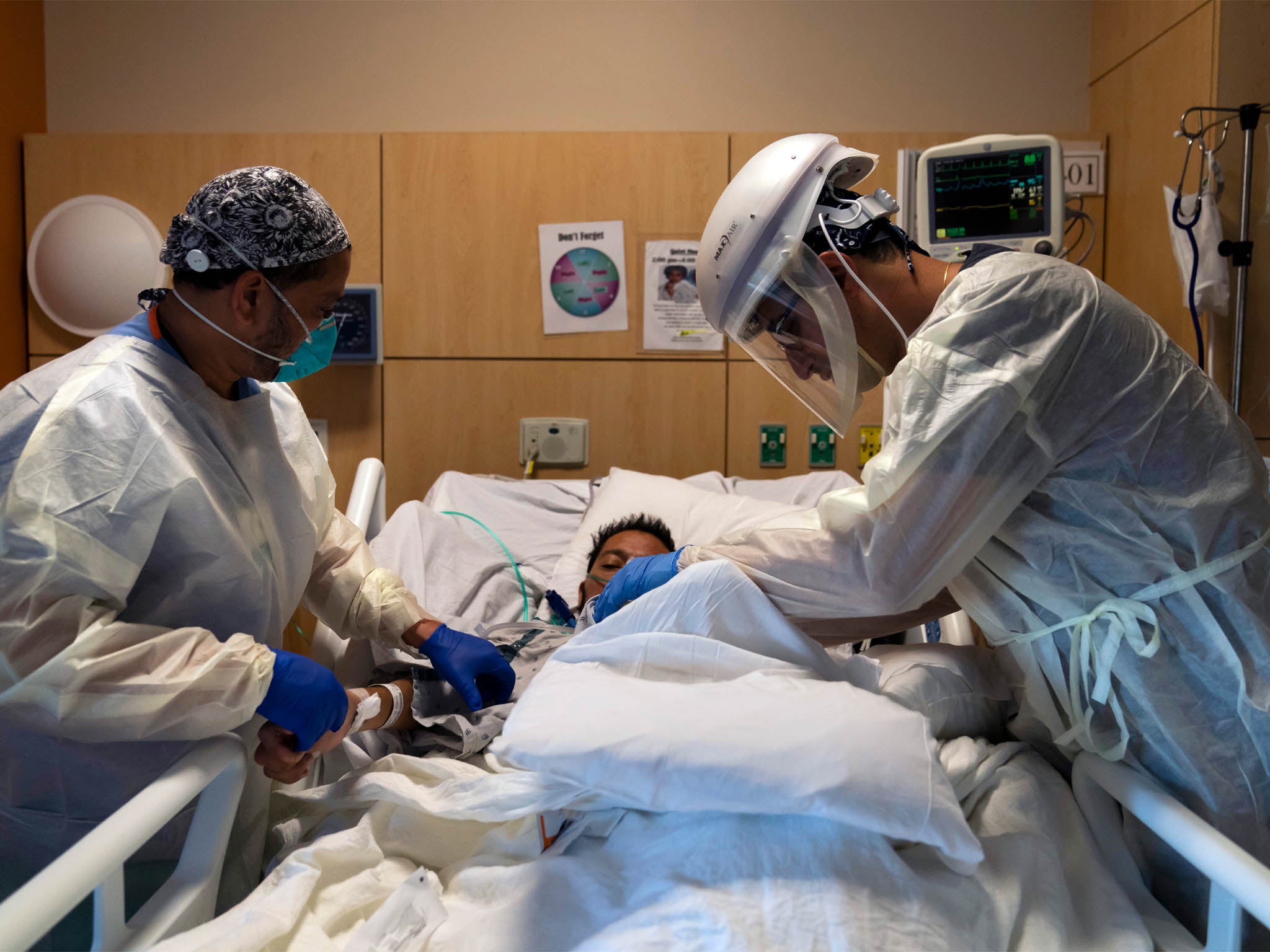California imposes strict curfew as Covid cases spiral
Hospitalisations in the state have increased by 64 per cent in two weeks

Your support helps us to tell the story
From reproductive rights to climate change to Big Tech, The Independent is on the ground when the story is developing. Whether it's investigating the financials of Elon Musk's pro-Trump PAC or producing our latest documentary, 'The A Word', which shines a light on the American women fighting for reproductive rights, we know how important it is to parse out the facts from the messaging.
At such a critical moment in US history, we need reporters on the ground. Your donation allows us to keep sending journalists to speak to both sides of the story.
The Independent is trusted by Americans across the entire political spectrum. And unlike many other quality news outlets, we choose not to lock Americans out of our reporting and analysis with paywalls. We believe quality journalism should be available to everyone, paid for by those who can afford it.
Your support makes all the difference.California announced an overnight curfew on Thursday in order to tackle a surge in coronavirus cases that threaten to overwhelm the state’s healthcare system.
Officials have ordered nearly all residents to stay at home from 10pm to 5am with the exception of essential journeys, while some law enforcement have said they will not enforce the curfew.
Due to start on Saturday, the restrictions will last until 21 December though may be extended if cases continue to rise.
Cases of Covid-19 are surging across the US, with hospitalisations in the west coast state up by 64 per cent in just two weeks, while the rate of people testing positive for the virus has increased by more than 50 per cent, now standing at 5.6 per cent for the last seven days.
The curfew extends to 94 per cent of California’s nearly 40 million residents, covering 41 of the state's 58 countries that have seen the most significant increase in coronavirus cases.
California recently imposed a four-tier system for reopening the economy, with this latest measure coming just three days after tougher restrictions were announced to limit business operations within the 41 counties.
As Thanksgiving approaches, concerns have been raised over large gatherings of people as friends and family may be tempted to meet over the national holiday.
Health experts say social mixing and indoor gatherings during the approaching holiday season, combined with colder weather, is likely to accelerate the spike in cases.
In a statement, California governor Gavin Newsom said: "The virus is spreading at a pace we haven't seen since the start of this pandemic, and the next several days and weeks will be critical to stop the surge. We are sounding the alarm.”
The state recorded 11,478 cases on Thursday, its highest tally since mid-August. Meanwhile, California’s top health officer, Dr Mark Ghaly, said throughout the pandemic around 12 per cent of positive cases required hospitalisations. Based on this calculation, around 1,200 people will be admitted to hospital in the next two to three weeks if cases continue to rise.
Though the new health order does not close businesses, they must shut by 10pm, with restaurants only permitted to offer takeaways and delivery after that time.
The curfew announcement comes two days after Los Angeles County ordered restaurants and retail outlets to close after 10pm. The state’s 10 million residents in California’s largest county will now be subject to the statewide curfew.
Exceptions to the restrictions include food shopping, medical care, prescriptions and caring duties during the curfew hours.
A number of Republican lawmakers in the state have raised concerns about the curfew and while the new measure relies heavily on the compliance of law enforcement, sheriffs in counties including El Dorado, Orange and Sacramento have said they would not enforce the new restriction.
Curt Hagman, chairman of the San Bernardino County Board of Supervisors, said he does not believe the curfew is an effective means to tackle the virus.
"We're not going to be sitting out arresting people if they're out at 10:30 at night. We don't have the resources," Mr Hagman said.
The state's second most populous county, San Diego, is now seeing spikes of the virus after experiencing a lower number of cases than most of the counties throughout the pandemic.
San Diego County supervisor Nathan Fletcher said he believes the "vast majority" of residents will accept why the curfew is being imposed.
"This is an attempt to have everyone understand the severity of the situation we face," Mr Fletcher said.
Earlier this week, Ohio governor Mike DeWine ordered a similar three-week state curfew from 10pm to 5am for most residents.
California was the first state in the US to impose a stay at home order in March with Mr Ghaly saying that the new health order is a more targeted approach compared to another full lockdown.
He added that people socialising late at night is more likely to carry an increased risk of infection, particularly with drinking involved as people may let their guard down on precautionary measures including mask wearing and social distancing.






Join our commenting forum
Join thought-provoking conversations, follow other Independent readers and see their replies
Comments